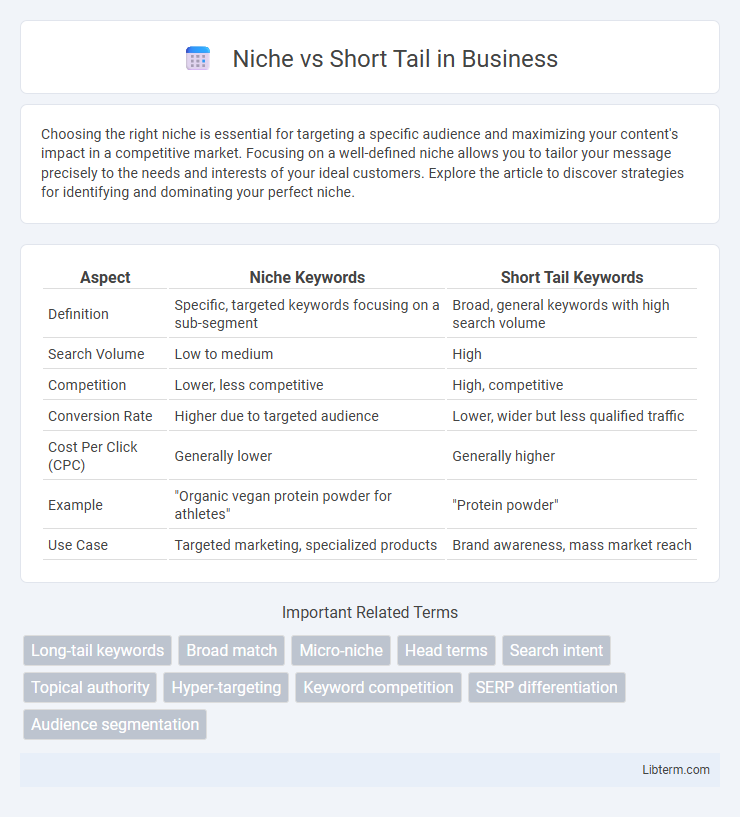Choosing the right niche is essential for targeting a specific audience and maximizing your content's impact in a competitive market. Focusing on a well-defined niche allows you to tailor your message precisely to the needs and interests of your ideal customers. Explore the article to discover strategies for identifying and dominating your perfect niche.
Table of Comparison
| Aspect | Niche Keywords | Short Tail Keywords |
|---|---|---|
| Definition | Specific, targeted keywords focusing on a sub-segment | Broad, general keywords with high search volume |
| Search Volume | Low to medium | High |
| Competition | Lower, less competitive | High, competitive |
| Conversion Rate | Higher due to targeted audience | Lower, wider but less qualified traffic |
| Cost Per Click (CPC) | Generally lower | Generally higher |
| Example | "Organic vegan protein powder for athletes" | "Protein powder" |
| Use Case | Targeted marketing, specialized products | Brand awareness, mass market reach |
Understanding Niche and Short Tail Keywords
Niche keywords target specific, smaller audience segments with higher intent and lower competition, making them ideal for focused marketing strategies and improving conversion rates. Short tail keywords are broad, high-volume search terms that attract large, general audiences but face intense competition and lower conversion potential. Understanding the balance between niche and short tail keywords enables businesses to optimize SEO efforts by combining targeted relevance with broader reach.
Key Differences Between Niche and Short Tail
Niche keywords target highly specific search queries with lower search volume and less competition, while short tail keywords are broad, high-volume search phrases with intense competition. Niche keywords drive highly targeted traffic and improve conversion rates by addressing precise user intent, whereas short tail keywords increase brand visibility due to their wide reach. Effective SEO strategies balance niche keywords for quality leads and short tail keywords for broader exposure.
Benefits of Targeting Niche Keywords
Targeting niche keywords allows businesses to reach highly specific audiences, increasing the likelihood of conversion due to focused user intent. These keywords typically have lower competition, making it easier and more cost-effective to rank higher in search engine results. Moreover, niche targeting enhances relevance and engagement by addressing particular needs, leading to better customer satisfaction and loyalty.
Advantages of Using Short Tail Keywords
Short tail keywords generate high search volumes, driving substantial traffic to websites by capturing broad audience interests. Their simplicity enhances visibility on search engine results pages, increasing brand awareness more rapidly than niche keywords. Using short tail keywords also reduces complexity in SEO strategy, making it easier to target popular search intents and attract diverse user groups efficiently.
SEO Impact: Niche vs Short Tail
Niche keywords target highly specific search queries, resulting in lower competition and higher conversion rates due to their precise user intent, while short tail keywords generate significantly higher search volumes but face intense competition and lower conversion rates. SEO strategies leveraging niche keywords often achieve faster rankings and attract more qualified traffic, enhancing ROI for specialized content. In contrast, short tail keywords are essential for broad brand visibility but require substantial investment in content and backlinks to maintain competitive positioning.
Audience Targeting: Precision vs Reach
Niche keywords target highly specific audience segments, delivering precision in audience engagement and higher conversion rates due to tailored content relevance. Short tail keywords cast a wider net, maximizing reach and brand visibility but often result in lower conversion rates due to broad search intent. Effective audience targeting requires balancing the narrow focus of niche keywords with the extensive exposure short tail keywords provide.
Content Strategies for Niche Keywords
Niche keywords target specific, highly focused audience segments, resulting in lower competition and higher conversion rates compared to short tail keywords that are broader and more competitive. Content strategies for niche keywords emphasize creating in-depth, valuable articles that address particular user intents, leveraging long-tail phrases and detailed topics to rank higher in search results. Optimizing for niche keywords involves thorough keyword research, producing comprehensive content, and engaging with a specialized audience to build authority and drive targeted organic traffic.
Content Approaches for Short Tail Keywords
Short tail keywords, typically consisting of one to two words, have high search volume but also intense competition, making targeted content strategies essential for visibility. Content approaches for short tail keywords focus on broad topics, incorporating high-level information and frequently updated materials to rank well. Optimizing meta tags, using clear headings, and ensuring fast page load times are crucial techniques to enhance content performance for short tail keyword searches.
Choosing the Right Keyword Type for Your Goals
Choosing the right keyword type depends on your marketing goals, as niche keywords target specific audiences with higher conversion potential while short tail keywords attract broader traffic with increased competition. Niche keywords often generate quality leads by addressing detailed queries, making them ideal for brands focused on engagement and sales. In contrast, short tail keywords boost visibility and brand awareness, suitable for businesses aiming to expand reach quickly.
Combining Niche and Short Tail for Maximum Results
Combining niche and short tail keywords leverages the specificity of niche terms with the broad reach of short tail keywords, driving targeted traffic and increasing conversion rates. Using niche keywords attracts highly engaged audiences with clear intent, while short tail keywords generate higher search volumes, balancing visibility and relevance. A strategic mix enhances SEO performance by capturing both broad interest and focused user queries in competitive markets.
Niche Infographic

 libterm.com
libterm.com